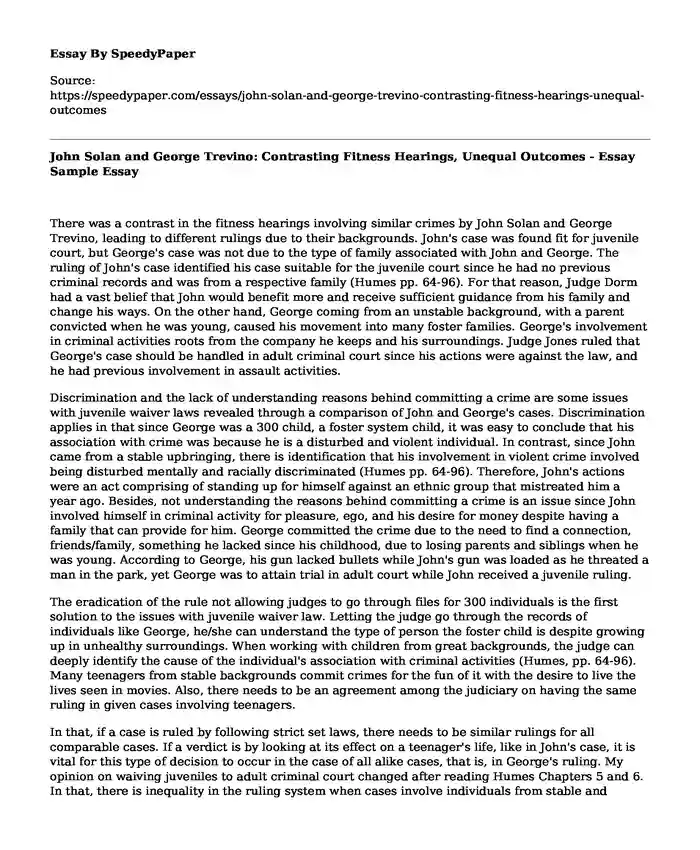There was a contrast in the fitness hearings involving similar crimes by John Solan and George Trevino, leading to different rulings due to their backgrounds. John's case was found fit for juvenile court, but George's case was not due to the type of family associated with John and George. The ruling of John's case identified his case suitable for the juvenile court since he had no previous criminal records and was from a respective family (Humes pp. 64-96). For that reason, Judge Dorm had a vast belief that John would benefit more and receive sufficient guidance from his family and change his ways. On the other hand, George coming from an unstable background, with a parent convicted when he was young, caused his movement into many foster families. George's involvement in criminal activities roots from the company he keeps and his surroundings. Judge Jones ruled that George's case should be handled in adult criminal court since his actions were against the law, and he had previous involvement in assault activities.
Discrimination and the lack of understanding reasons behind committing a crime are some issues with juvenile waiver laws revealed through a comparison of John and George's cases. Discrimination applies in that since George was a 300 child, a foster system child, it was easy to conclude that his association with crime was because he is a disturbed and violent individual. In contrast, since John came from a stable upbringing, there is identification that his involvement in violent crime involved being disturbed mentally and racially discriminated (Humes pp. 64-96). Therefore, John's actions were an act comprising of standing up for himself against an ethnic group that mistreated him a year ago. Besides, not understanding the reasons behind committing a crime is an issue since John involved himself in criminal activity for pleasure, ego, and his desire for money despite having a family that can provide for him. George committed the crime due to the need to find a connection, friends/family, something he lacked since his childhood, due to losing parents and siblings when he was young. According to George, his gun lacked bullets while John's gun was loaded as he threated a man in the park, yet George was to attain trial in adult court while John received a juvenile ruling.
The eradication of the rule not allowing judges to go through files for 300 individuals is the first solution to the issues with juvenile waiver law. Letting the judge go through the records of individuals like George, he/she can understand the type of person the foster child is despite growing up in unhealthy surroundings. When working with children from great backgrounds, the judge can deeply identify the cause of the individual's association with criminal activities (Humes, pp. 64-96). Many teenagers from stable backgrounds commit crimes for the fun of it with the desire to live the lives seen in movies. Also, there needs to be an agreement among the judiciary on having the same ruling in given cases involving teenagers.
In that, if a case is ruled by following strict set laws, there needs to be similar rulings for all comparable cases. If a verdict is by looking at its effect on a teenager's life, like in John's case, it is vital for this type of decision to occur in the case of all alike cases, that is, in George's ruling. My opinion on waiving juveniles to adult criminal court changed after reading Humes Chapters 5 and 6. In that, there is inequality in the ruling system when cases involve individuals from stable and unstable backgrounds. It is crucial to look at a juvenile case in a similar way that Judge Dorm did to ensure that a ruling helps change an individual's life instead of destroying it further, like in the case of George.
Works Cited
Humes, Edward. "Chapter 5: Punks and Chapter 6: Raised by the State." No matter how loud I shout: A year in the life of the juvenile court, Simon & Schuster, 1996, pp. 64-96.
Cite this page
John Solan and George Trevino: Contrasting Fitness Hearings, Unequal Outcomes - Essay Sample. (2023, Oct 29). Retrieved from https://speedypaper.net/essays/john-solan-and-george-trevino-contrasting-fitness-hearings-unequal-outcomes
Request Removal
If you are the original author of this essay and no longer wish to have it published on the SpeedyPaper website, please click below to request its removal:
- Free Essay on Being a Good Student
- What is Double Jeopardy - Get the Answer in Our Free Essay
- Comparison Essay Sample: Human Rights Administrative Bodies in the EU Compared to the US
- Project Control Procurement - Project Management Essay Sample
- Essay Example about Water Advertisements
- Essay Example on Accounting for Employee Stock Options
- Free Essay. Importance of Body-Worn Cameras in Law Enforcement
Popular categories





